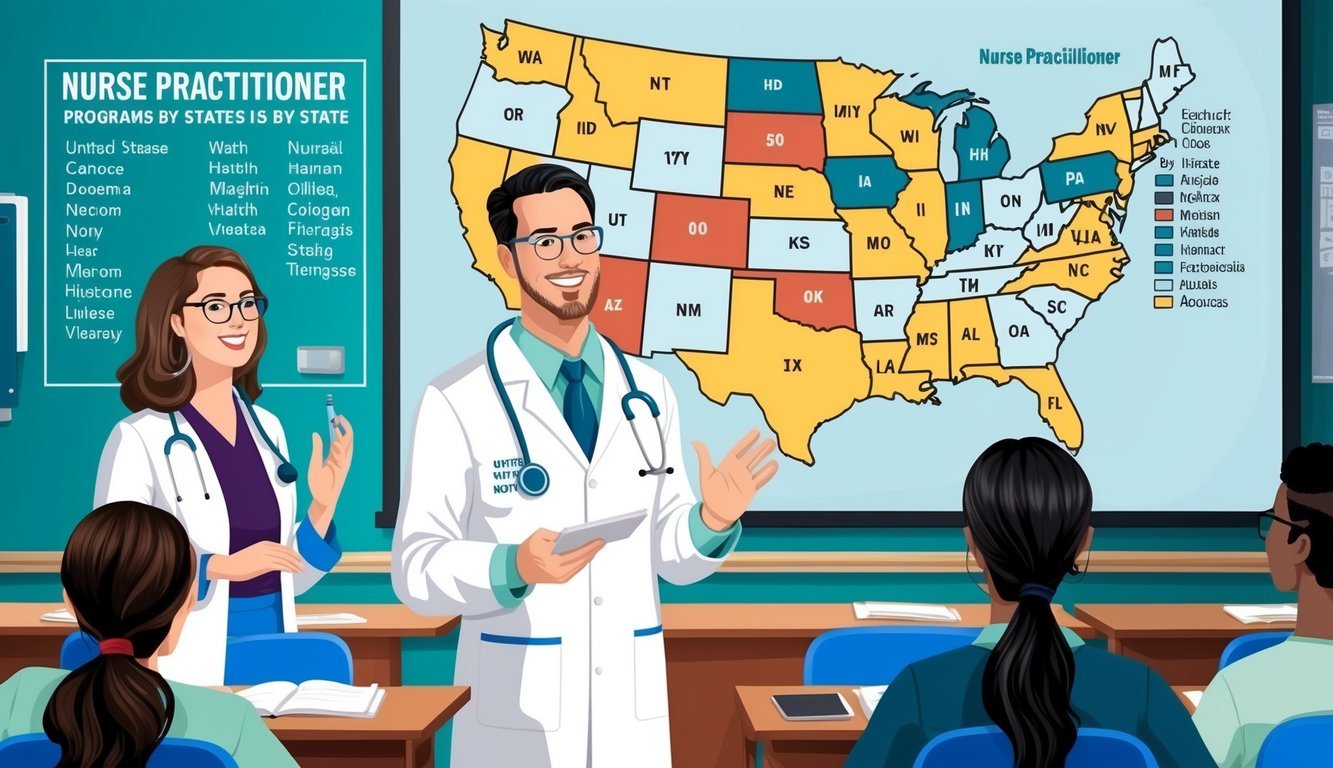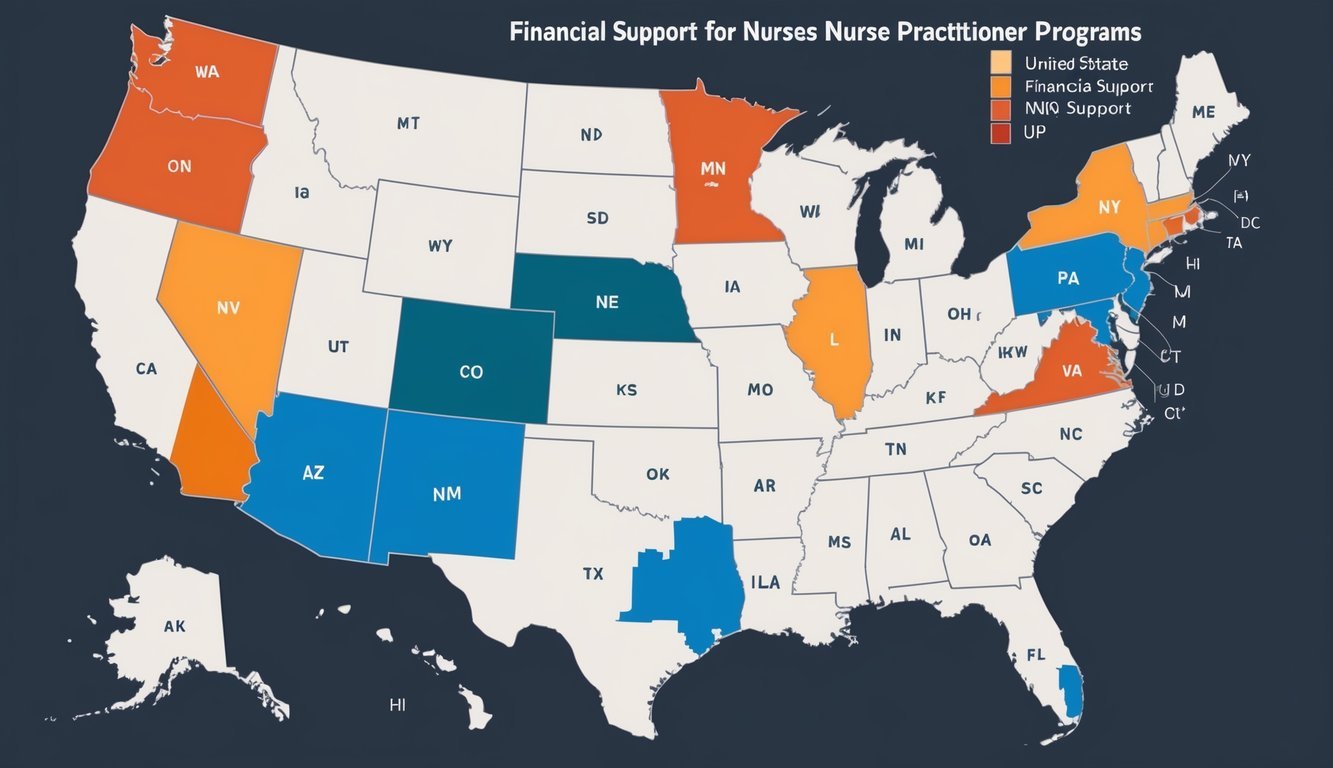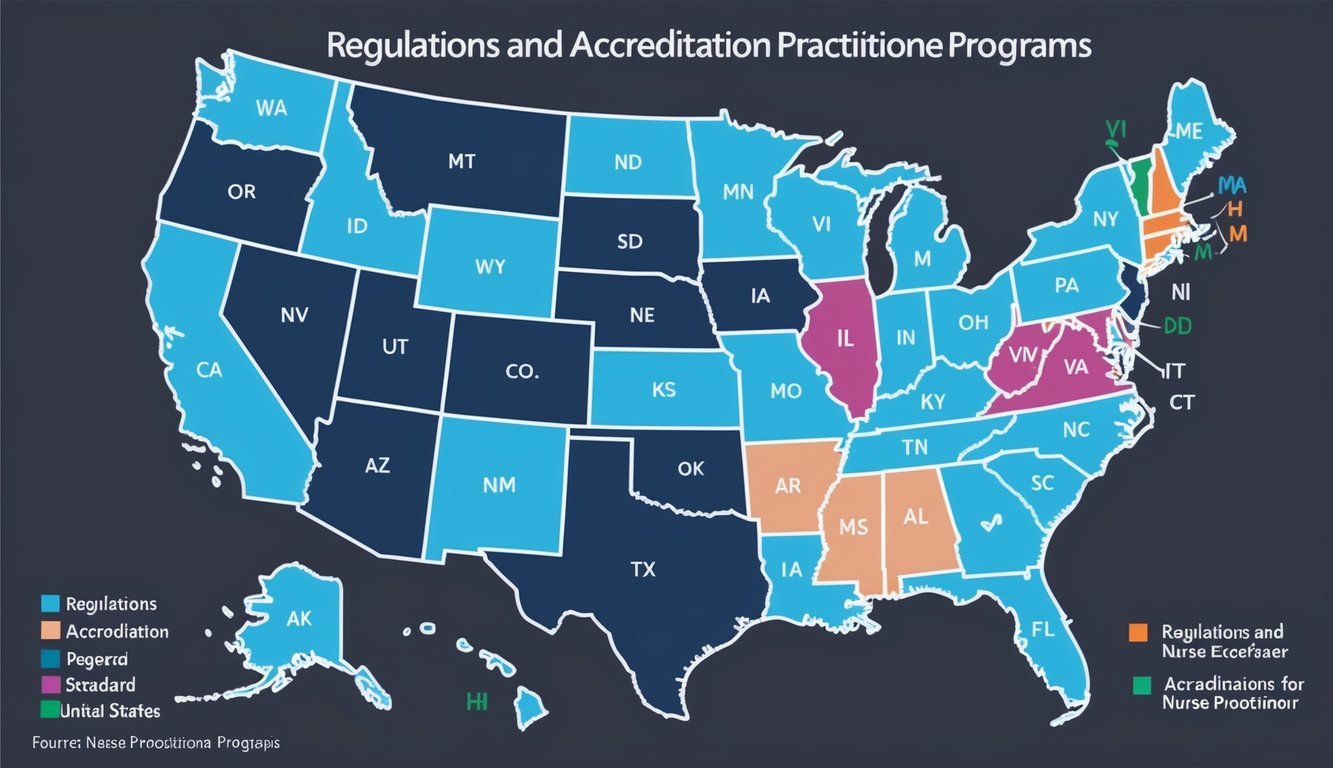Becoming a nurse practitioner can be a rewarding career choice that offers both personal fulfillment and career advancement.
If you are considering this path, knowing the best nurse practitioner programs by state can greatly help you choose a program that fits your needs.
Each state has various accredited programs that provide the necessary education and hands-on training to succeed in this advanced nursing role.
As you explore your options, it’s crucial to understand the requirements and opportunities each program offers.
From educational pathways to clinical training, the choices you make will significantly impact your nursing career.
Whether you want to specialize in family practice, pediatrics, or another area, there are programs tailored to your interests and career goals.
In addition to the educational aspects, consider the financial factors and available support.
Scholarships and funding options can make a big difference in your educational journey.
These considerations will help you make an informed decision about which nurse practitioner program is right for you.
Key Takeaways
- Research various nurse practitioner programs available in your state for informed choices.
- Financial support options can ease the burden of education costs.
- Each program has specific requirements and specializations to explore.
Understanding the Nurse Practitioner Role

The nurse practitioner (NP) role is essential in today’s healthcare system.
This section highlights the scope of practice, education requirements, and the impact NPs have on healthcare delivery.
Scope of Practice and Specializations
Nurse practitioners have a broad scope of practice, which can vary by state regulations.
NPs can provide care in various settings, including clinics and hospitals, and manage both acute and chronic illnesses.
They often specialize in fields such as:
- Family Nurse Practitioner (FNP): Provides care across all ages.
- Pediatric Nurse Practitioner (PNP): Focuses on children’s health.
- Adult-Gerontology Nurse Practitioner (AGNP): Caters to adults, including the elderly.
- Psychiatric Mental Health Nurse Practitioner (PMHNP): Addresses mental health needs.
- Acute Care Nurse Practitioner (ACNP): Manages patients with severe medical issues.
These specializations help NPs meet specific patient needs.
You can learn more about state regulations and practice authority at Nurse Practitioner Practice Authority.
Education and Certification Requirements
To become an NP, you must complete a graduate-level program, typically a Master’s of Science in Nursing (MSN) or Doctor of Nursing Practice (DNP).
Programs usually include advanced coursework in diagnosis, treatment, and patient management.
Certification is vital for practice.
After graduation, you need to pass a national certification exam in your chosen specialty.
This ensures you are qualified to provide appropriate care.
Most states also require continuing education to maintain your license.
This can involve attending workshops, online courses, or other educational offerings related to your specialty.
You can explore more about nurse practitioner programs at Top Nurse Practitioner Programs by State.
Impact on Healthcare Delivery
Nurse practitioners play a crucial role in improving healthcare access and outcomes.
They can perform many of the same functions as physicians, including diagnosing conditions, prescribing medications, and developing treatment plans.
By providing care in underserved areas, NPs help reduce healthcare disparities.
They often spend more time with patients, allowing for more personalized care and better health management.
In primary care settings, NPs are essential in managing chronic diseases and preventive care.
They are trained to focus on holistic health approaches, contributing to general population well-being.
More information about the NP role can be found in the NP Fact Sheet.
Nurse Practitioner Educational Pathways

Becoming a nurse practitioner (NP) requires a structured educational pathway.
There are different program options available for registered nurses (RNs) who aspire to advance their careers.
You have choices whether you aim for a Master of Science in Nursing (MSN) or a Doctor of Nursing Practice (DNP).
Additionally, many programs are now offered online or in hybrid formats, making it easier to pursue your degree while balancing other commitments.
From RN to NP: Program Options
To transition from RN to NP, you need to complete specific educational programs.
You can choose between various pathways based on your current qualifications.
- BSN to NP: If you hold a Bachelor of Science in Nursing (BSN), you can enroll directly in a graduate NP program.
- ADN to BSN: If you have an Associate Degree in Nursing (ADN), consider completing a BSN degree first, which is often a prerequisite for NP programs.
Many accredited nursing school programs offer specialized NP tracks, focusing on areas like family, pediatrics, or mental health.
It’s essential to meet NP requirements by obtaining your advanced practice registered nurse (APRN) license after graduation.
Master of Science in Nursing (MSN) Versus Doctor of Nursing Practice (DNP)
When considering graduate education, you will face the choice between an MSN and a DNP program.
Both degrees prepare you for advanced practice but differ in focus.
-
MSN: This program typically takes 1-2 years to complete and focuses on clinical practice and leadership. It can lead to roles as a nurse practitioner or clinical nurse leader.
-
DNP: This is a terminal degree that usually takes 3-4 years. It emphasizes advanced clinical skills, evidence-based practice, and leadership in healthcare. A DNP program often includes a capstone project which applies practical solutions to health issues.
The choice depends on your career goals; an MSN may lead to immediate NP roles, while a DNP prepares you for higher-level positions and leadership.
Online Education and Hybrid Programs
Many nursing programs now offer online education and hybrid options, making it convenient to advance your career.
-
Online NP Programs: These programs provide flexibility, allowing you to manage your studies while working. They typically include virtual coursework, but you may need in-person clinical placements.
-
Hybrid Programs: This format combines online coursework with on-campus experiences. It can help you build connections with faculty and peers while still enjoying the flexibility of online learning.
When choosing a program, ensure it is from an accredited institution to maintain the quality of your education.
You can find a variety of online nurse practitioner programs that cater to different needs and schedules.
Clinical Training and Experience

Clinical training and experience are essential for becoming a successful nurse practitioner.
During this phase, you gather hands-on experience while developing the competences needed for safe and effective patient care.
This training not only focuses on the number of clinical hours but also on skill development and transitioning into practice.
Supervised Clinical Hours
Supervised clinical hours are a crucial part of nurse practitioner programs.
They allow you to apply your classroom knowledge in real healthcare settings under the guidance of experienced professionals.
Most programs require you to complete a specific number of clinical hours, often ranging from 500 to 1000 hours.
This varies by state and program, so it’s important to check requirements.
During these hours, you will work with patients in various settings, including hospitals, clinics, and private practices.
This experience helps you develop critical thinking skills, assess patient needs, and manage treatment plans effectively.
Advanced Practice Skills Development
In addition to clinical hours, programs emphasize developing advanced practice skills.
This training includes learning how to perform physical exams, interpret diagnostic tests, and make clinical decisions.
You will focus on areas such as:
- Patient Assessment: Evaluating patient history and symptoms.
- Diagnosis Skills: Identifying health conditions based on clinical findings.
- Treatment Planning: Formulating plans based on evidence-based guidelines.
These skills are vital for providing high-quality patient care and fulfilling the roles as advanced practice nurses.
You’ll work on building confidence and competence in these areas through simulations and hands-on practice.
Transitioning from Education to Practice
Transitioning from education to practice can be challenging.
Nurse practitioner programs aim to prepare you for this shift by integrating clinical experience with education.
You will receive support through mentorship and residency programs that ease the transition.
These programs often pair you with experienced nurse practitioners who guide you in daily practice, helping you refine your skills and adapt to the demands of patient care.
This support system is crucial for building your confidence and ensuring you are ready for the responsibilities of the role.
Engaging in community health and interdisciplinary collaboration is also emphasized during this transition, preparing you to navigate complex healthcare environments effectively.
Financial Considerations and Support

When pursuing a nurse practitioner program, understanding the financial aspects is crucial.
This includes assessing tuition costs, exploring financial aid options, and evaluating the potential return on investment for your education.
Tuition Costs and Financial Aid Opportunities
Tuition costs for nurse practitioner programs can vary widely based on the institution and location.
Typically, you might find tuition rates ranging from $20,000 to $50,000 for a full program.
Public universities often offer lower rates for in-state students, while private institutions usually charge higher fees.
It’s important to explore financial aid opportunities.
Many schools provide federal financial aid, loans, and work-study programs.
You can fill out the FAFSA application to determine your eligibility for federal assistance.
Additionally, some schools may offer specific financial aid programs for graduate students in nursing.
Return on Investment and Career Outlook
The return on investment (ROI) for nurse practitioners can be substantial.
NPs generally earn between $90,000 and $120,000 annually, depending on their specialty and location.
This robust income can help you pay off any educational loans quickly and secure a comfortable lifestyle.
Furthermore, the demand for nurse practitioners is expected to grow.
Experts predict job growth of about 45% over the next decade.
This strong job outlook can ensure that your investment in education pays off in the long run.
Scholarships and Grants for NP Students
There are numerous scholarships and grants available specifically for nurse practitioner students.
These can help reduce your upfront costs and lessen the financial burden associated with your education.
- National Health Service Corps Scholarship: Offers financial aid in exchange for service in underserved areas.
- AANP Foundation Scholarships: The American Association of Nurse Practitioners provides various scholarships for nursing students.
- State-specific scholarships: Many states have their own programs to financially support nursing education.
Researching and applying for these opportunities is essential.
Check school websites and organizations focused on nurse practitioners for updated information on available financial support.
Utilizing these resources can significantly ease your financial journey through NP education.
Regulations and Accreditation Standards

Understanding the regulations and accreditation standards for nurse practitioner programs is crucial for your professional journey.
These guidelines vary significantly by state and affect licensure, program credibility, and ongoing education.
State-by-State Licensure Variances
Licensure for nurse practitioners (NPs) varies by state, and this affects your ability to practice independently.
Some states offer full practice authority, allowing NPs to assess patients, prescribe medication, and manage treatment without physician oversight.
Here’s a quick breakdown of licensure categories:
| State Licensure Authority | Description |
|---|---|
| Full Practice | NPs can independently provide care. |
| Reduced Practice | NPs need a collaborative agreement with a physician. |
| Restricted Practice | NPs can only perform specific functions. |
To find out the specific requirements in your state, you can visit The American Association of Nurse Practitioners.
Accreditation Agencies and Academic Credibility
Accreditation plays a key role in ensuring that your chosen NP program meets national educational standards.
Programs accredited by recognized bodies, like the Commission on Collegiate Nursing Education (CCNE) or the Accreditation Commission for Education in Nursing (ACEN), are more likely to provide quality education.
Important Points:
- Graduating from an accredited program is often a requirement for licensure.
- Accreditation gives you confidence that the education provided meets current nursing standards.
You can learn more about accreditation and find accredited programs at AACN Nursing.
Continuing Education and Professional Development
Continuing education is essential for maintaining your licensure and improving your skills.
Most states require NPs to complete a specific number of continuing education (CE) hours every few years to stay licensed.
Each state has its own requirements, which may include:
- Annual CE hours: Ranges from 15 to 30 hours depending on state rules.
- Topics: Must focus on clinical issues, education, or ethical concerns.
Stay informed about your state’s requirements through resources like Nurse.org.
Frequently Asked Questions
This section addresses common queries about nurse practitioner programs across the United States.
You’ll find information about program availability, online options, costs, and demand for certain specialties.
What are the best Nurse Practitioner programs available by state?
The best Nurse Practitioner programs often depend on the state’s accreditation and the quality of education offered.
Many top programs are highly ranked by various educational bodies.
Check resources like Nurse Journal for a state-by-state listing.
Which states offer fully online Nurse Practitioner programs?
Several states provide fully online Nurse Practitioner programs.
These programs allow you to earn your degree while balancing work and personal commitments.
Popular states for online education include Texas, California, and Florida.
Each state may have different requirements, so it’s essential to research each option.
Are there any states that provide free Nurse Practitioner programs?
While free Nurse Practitioner programs are rare, some states offer financial aid or grants that can cover tuition costs.
States with strong healthcare foundations may provide scholarships or funding opportunities.
It’s beneficial to check with individual schools and state healthcare initiatives for available programs.
How many Nurse Practitioner programs are available across the United States?
There are approximately 400 Nurse Practitioner programs in the United States.
Each program varies in specialty, duration, and requirements.
The American Association of Nurse Practitioners provides a comprehensive list of these programs to help you find what suits your needs best.
Which Nurse Practitioner specialty is currently the most in demand?
The most in-demand Nurse Practitioner specialty currently is Family Nurse Practitioner (FNP).
This specialty is versatile and allows practitioners to serve patients of all ages.
Other growing specialties include psychiatric-mental health and pediatric nurse practitioners.
What are the admission requirements for the most competitive NP programs?
Admission requirements can vary by program.
However, the most competitive NP programs typically require a Bachelor of Science in Nursing (BSN), a minimum GPA, and relevant clinical experience.
Many programs also ask for letters of recommendation and a personal statement.
Always check specific program requirements to ensure you meet them.

